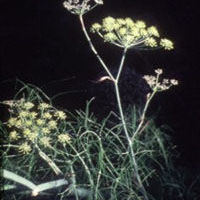Penn Herb Wellness Guide
FennelFind Products
 © Steven Foster
© Steven FosterHow It Works
The major constituents, which include the terpenoid anethole, are found in the volatile oil. Anethole and other terpenoids inhibit spasms in smooth muscles,3 such as those in the intestinal tract, and this is thought to contribute to fennel’s use as a carminative (gas-relieving and gastrointestinal tract cramp-relieving agent). Related compounds to anethole may have mild estrogenic actions, although this has not been proven in humans. Fennel is also thought to possess diuretic (increase in urine production), choleretic (increase in production of bile), pain-reducing, fever-reducing, and anti-microbial actions.4 Fennel was formerly an official drug in the United States and was listed as being used for indigestion.5
How to Use It
The German Commission E monograph recommends 11 1/2 teaspoons (57 grams) of seeds per day.6 To make a tea, boil 1/2 teaspoon (23 grams) of crushed seeds per 1 cup (250 ml) of water for ten to fifteen minutes, keeping the pot covered during the process. Cool, strain, and then drink three cups (750 ml) per day. As a tincture, 12 teaspoons (510 ml) can be taken three times per day between meals.
Copyright 2025 TraceGains, Inc. All rights reserved.
Learn more about TraceGains, the company.
The information presented by TraceGains is for informational purposes only. It is based on scientific studies (human, animal, or in vitro), clinical experience, or traditional usage as cited in each article. The results reported may not necessarily occur in all individuals. Self-treatment is not recommended for life-threatening conditions that require medical treatment under a doctor's care. For many of the conditions discussed, treatment with prescription or over the counter medication is also available. Consult your doctor, practitioner, and/or pharmacist for any health problem and before using any supplements or before making any changes in prescribed medications. Information expires December 2025.


